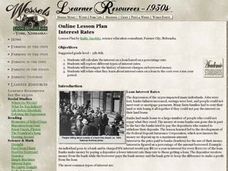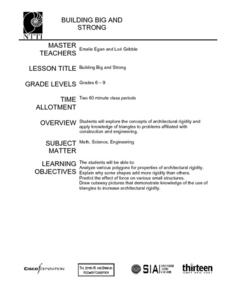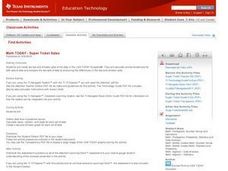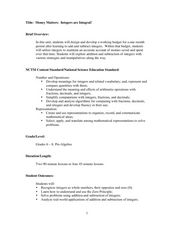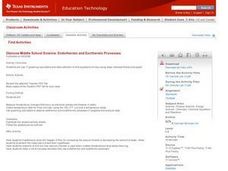Curated OER
Interest Rates
Use a KWL chart and discussion to explore the concept behind loans with interest based on percentage rates. Learners examine different types of interest, the history of interest loans and calculate the costs of a loan over a ten-year...
Curated OER
Building Big and Strong
Middle and high schoolers explore the concepts of architectural rigidity. They analyze a variety of polygons, and explain why some shapes add more strength to structures than others. The PBS video, "Building Big," is utilized in this plan.
Curated OER
Proving (a Theorem) and Disproving (a Theory)
As a cross-curricular lesson, your class examines the issues of gender discrimination, careers, and gender roles. They read and discuss an article, prepare a proof of the Pythagorean theorem as a class, and develop a creative...
Curated OER
Swinging Pendulum
Students engage in an activity which demonstrates how potential energy (PE) can be converted to kinetic energy (KE) and back again. Given a pendulum height, students calculate and predict how fast the pendulum will swing by understanding...
Curated OER
Pythagorean Theorem by Graphic Manipulation
There are many different ways to show a proof of the Pythagorean Theorem. Here is a nice hands-on paper cutting activity that shows a graphic representation. You can even challenge your young Pythagoreans to come up with their own...
Curated OER
Data Analysis
Young statisticians use and interpret measures of center and spread such as mean, median, and mode as well as range. They use box plots to represent their data and answer questions regarding the correspondence between data sets and the...
Curated OER
My Angle on Cooling
Students explore how the angle and distance of an object can change it's temperature. After reviewing how the position of the Earth affects the temperature of the planet, student groups design and perform an experiment to test how...
Curated OER
Super Ticket Sales
Use this graphing data using box and whisker plots lesson to have learners make box and whisker plots about ticket sales of popular movies. They find the mean, median, and mode of the data. Pupils compare ticket sales of the opening...
Curated OER
Curve Ball
Create a Height-Time plot of a bouncing ball using a graphing calculator. Graph height as a function of time and identify the vertex form of a quadratic equation that is generated to describe the ball's motion. Finally, answer questions...
Texas Instruments
Changing Functions
Your algebra 2 learners show what they can do in this assessment activity on shifting, reflecting, and stretching graphs. Given the graphs of various functions, they write the represented equation.
Texas Instruments
Exploring Basic Equations
Learners explore equations with constants, variables and with exponents. They identify and define variables, constants, exponents, expressions, and equations, as well as give an example of each. Your class will also draw their...
Curated OER
Goal Setting
Students understand how they can incorporate dietary guidelines in their daily life. For this investigative lesson students set dietary goals and incorporate an activity to learn how to create a new seed variety while studying...
Curated OER
Money Management Part III: Savings Accounts and Cash vs. Credit
Help your class understand the importance of saving and managing their money. Here is part three to a unit on credit, cash, and savings. Learners discuss savings accounts and the idea that a budget plan can help them avoid costly credit...
National Security Agency
Ordering, Adding and Subtracting Integers
Prealgebrarians use colored chips, stickers, and pencils to explore the world of integers. They discover absolute value, compare positive and negative integers, and apply operations to them. A detailed procedure for the three-part...
National Security Agency
Money Maters: Integers are Integral!
A thoroughly-written lesson plan and a plethora of worksheets about integers comprise this resource. Neophyte number crunchers learn to recognize integers, add and subtract them, and apply the concepts to the designing of a personal...
Curated OER
Interesting Integers and Exciting Equations
An 80-page resource provides four lessons and all associated worksheets to teach middle schoolers about expressions and equations. The lessons are hands-on, using games, "integer chips," a balance and cubes, and cut and paste activities....
Curated OER
Water Meter Reader
Junior high schoolers learn how to read a water meter, track their family water usage, and discuss the amount in class with other pupils. They will interpret real-world data and graph it. It is ideal for increasing awareness and...
National Security Agency
Classifying Triangles
Building on young mathematicians' prior knowledge of three-sided shapes, this lesson series explores the defining characteristics of different types of triangles. Starting with a shared reading of the children's book The Greedy...
Rainforest Alliance
Investments in Forest Carbon
One hundred metric tons of CO2 can accumulate in one acre of forest over time—that's a lot of carbon! In the activity, groups of middle school learners determine what makes forests important. They then solidify the concept by using a...
Polar Trec
Calorimetry Lab
Young people between the ages of 11–13 need on average about 2,000 calories per day. Within the lab, groups learn about calorimetry and respiration. They explore how it pertains to humans and animals living the Arctic where cold...
Beyond Benign
Packed Up Properties
Determine physical properties of potential packaging materials. Continuing from previous lessons in the series, the resource asks groups to identify physical properties of the substances. They test for conductivity, solubility, water...
Texas Education Agency (TEA)
Investigating STEM Cluster Careers
Science, technology, engineering, math—there are so many option in STEM! Using the resource, pupils identify and explore STEM career opportunities. They complete a vocabulary activity mat, crossword puzzle, and matching activity to learn...
Texas Instruments
Endothermic and Exothermic Processes
Students investigate temperature using the TI. In this chemistry lesson, students analyze the change in temperature, as chemicals are dissolved in water. They analyze data collected using the CBL 2.
Illustrative Mathematics
Sammy's Chipmunk and Squirrel Observations
Here is a fun project. Sammy observes a chipmunk and a squirrel to see how many holes each needs in order to stash the same number of acorns. Scholars could find the answer algebraically or create a table to analyze the...
Other popular searches
- Math and Science Careers
- Integrated Math and Science
- Science and Math
- Science/ Math Games
- Math and Science Activities
- Integrating Math and Science
- +Math and Science Careers
- Math and Science Plan
- Math and Science Lessons
- Word Origins Science Math
- Math in Science Experiments
- Science Math
